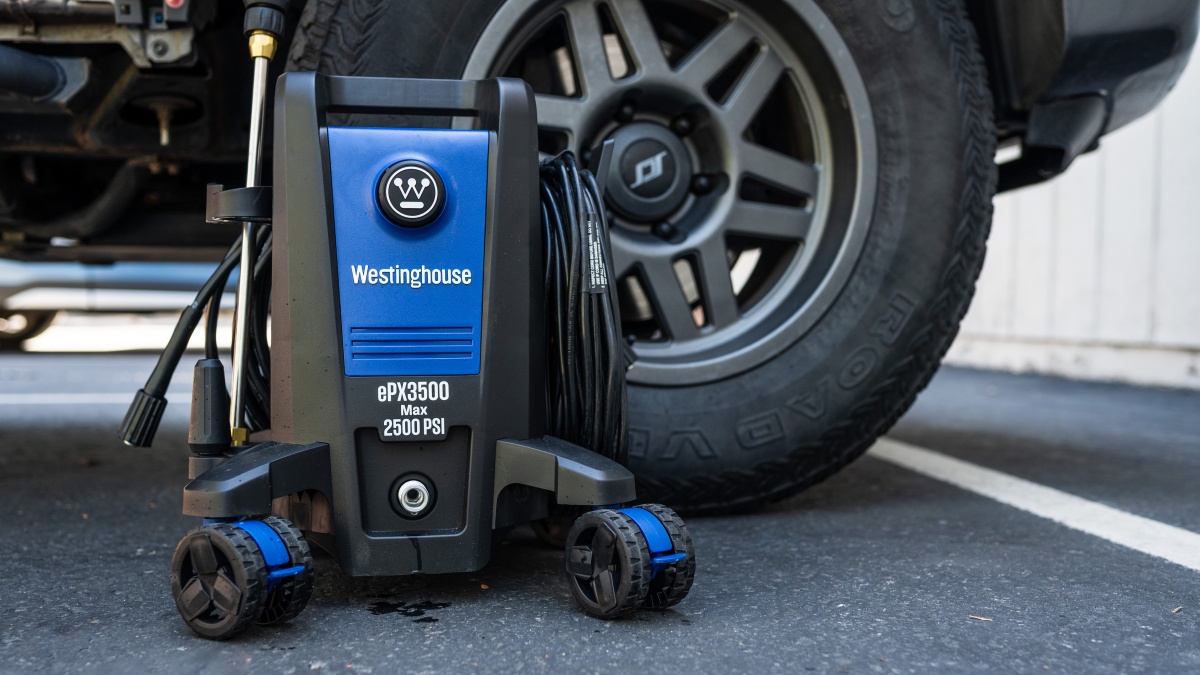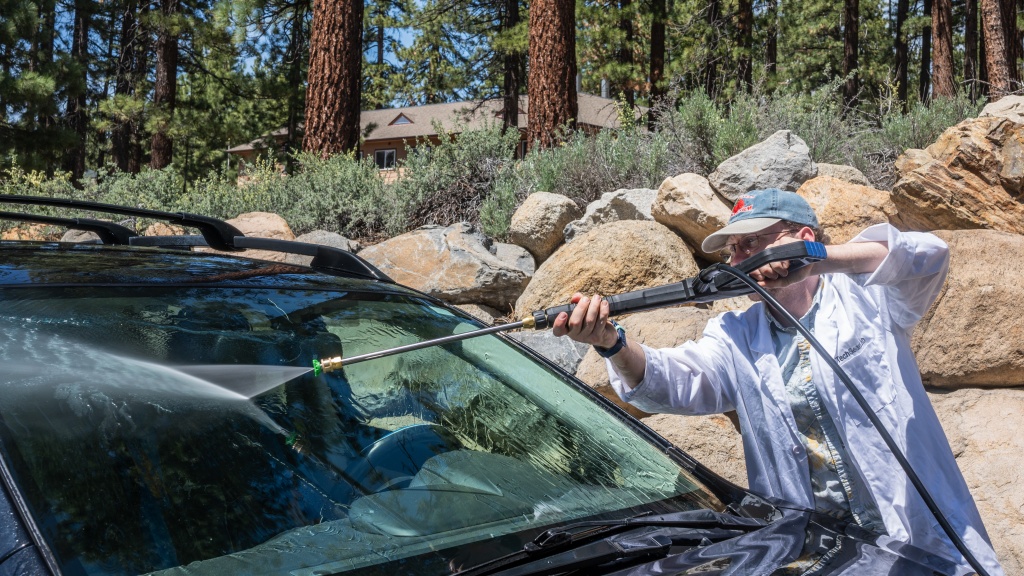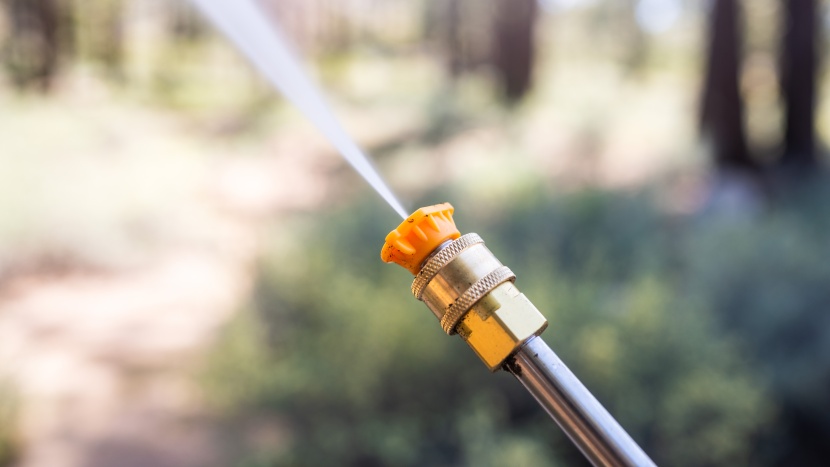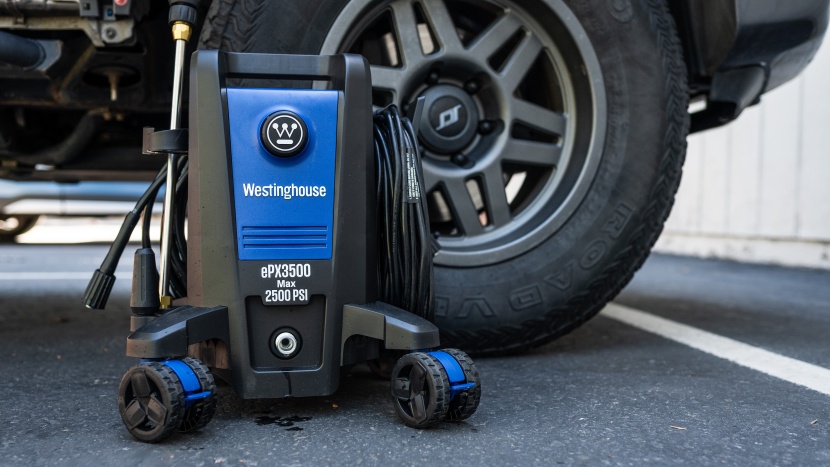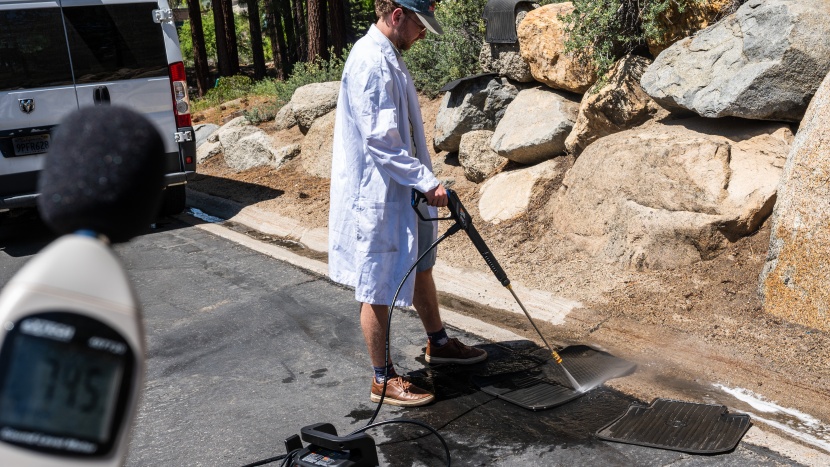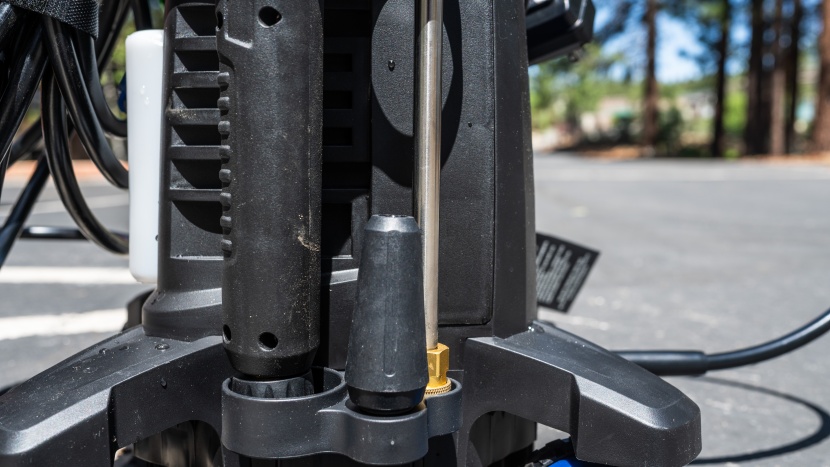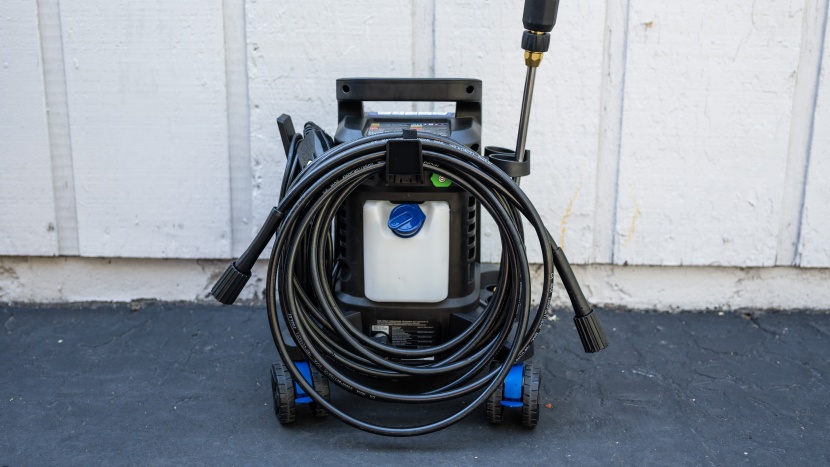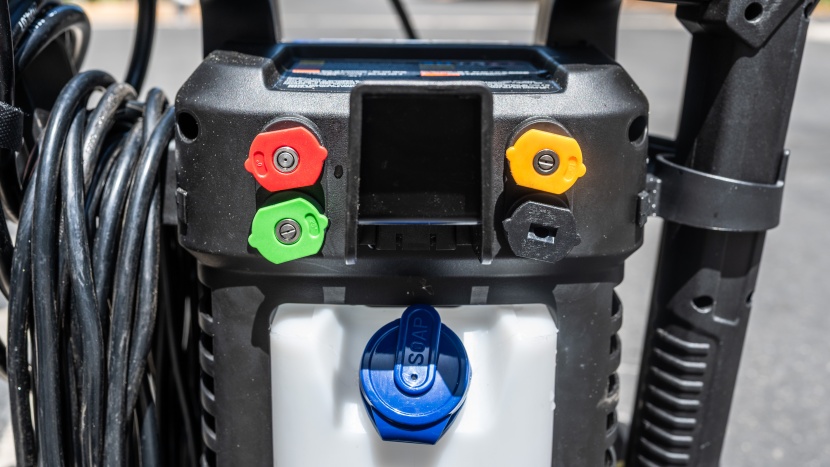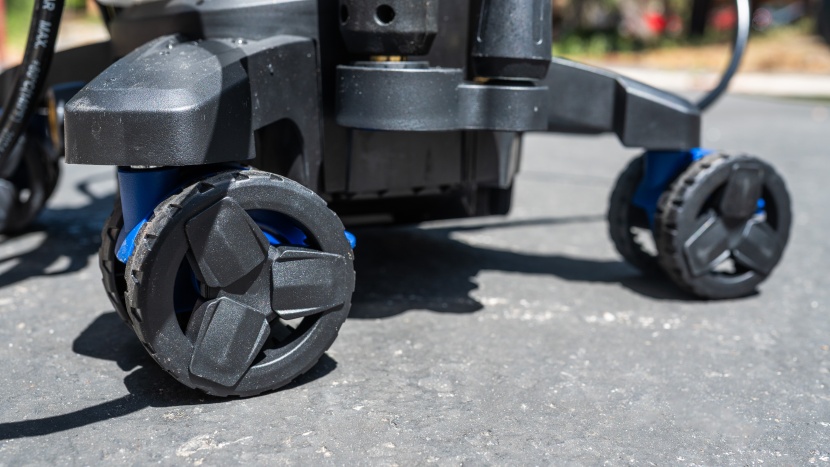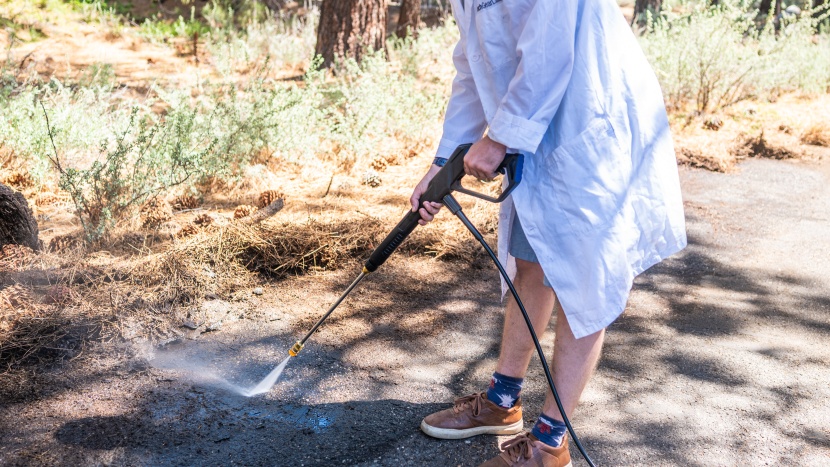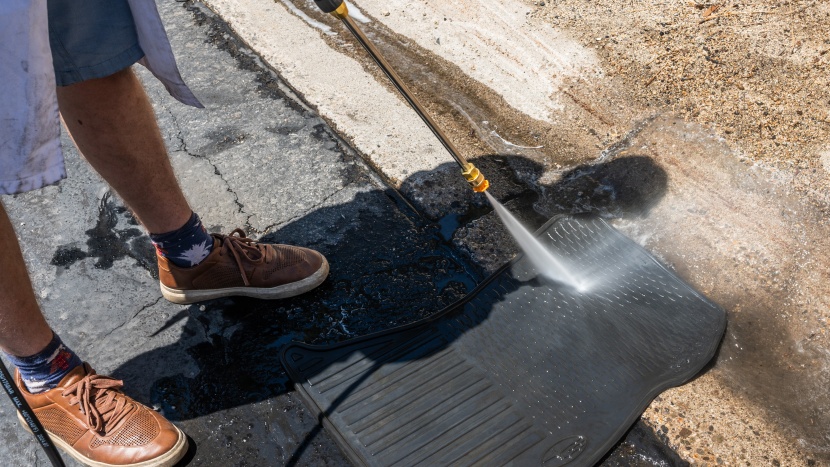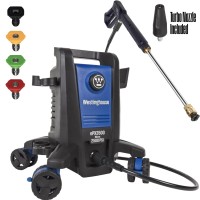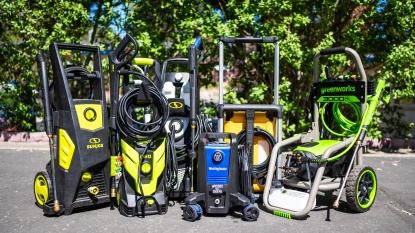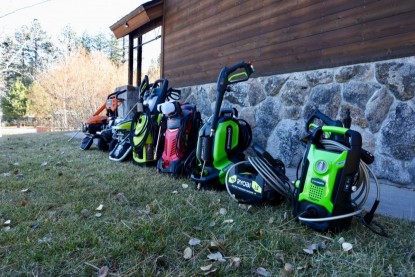
Our Verdict
Our Analysis and Test Results
The Westinghouse ePX3500 quickly captured our attention and affection, especially when compared to other electric models. This lightweight device can be easily lifted, moved, or stored in a small space while still producing sufficient cleaning power to facilitate various home projects. Not only does this miniature muscly machine possess enough hoops, loops, and nozzles to get the job done, but it'll also pack away neatly once completed — all at an economical price.
Cleaning
At the forefront of every pressure washer's design is one function — cleaning power to tackle various projects with ease and precision.
For a better understanding of this machine's actual cleaning power, we deferred to the professionals, who have a system of measurement called “Cleaning Units” (CU). To calculate a device's CU, simply multiply the pounds per square inch (psi) by the gallons per minute (gpm).
Once the in-line pressure meter was fixed onto the ePX3500's hose, it showed 1800 psi pumping through this tiny washer's veins.
We found the ePX again running in the middle of the electric pressure washer pack, displaying a 1.06 gpm flow rate.
After calculating recorded numbers and comparing them to the rest of our lineup, the fact is that the electric motor on the ePX3500 does not produce much power. This little washer produced only 1901 CU (Cleaning Units) and slipped down the ranks as an average to low-performing pressure washer. Regardless, we weren't surprised by these results, given that this tool's price is modest and its build is small, portable, and somewhat insubstantial.
Despite its mediocre power, the ePX3500 became far more favorable once it was time to wash a vehicle. For such a small unit, it boasts a whopping 20-ounce cleaning reservoir, and with the soap-specific nozzle attached, it pumps out enough suds and water to completely cover a car. When using the soap nozzle, we noticed that the ePX's pressure decreased slightly, but there was still enough brawn to bust through dirt, bugs, and detail those crusty crannies.
Once finished with soap, a set of additional 0-degree, 15-degree, 25-degree, and turbo nozzles are ready to rinse and clean anything you throw at it. While this pressure washer lacks heavyweight power, it makes up for it with outstanding soap-ability, and we wholeheartedly recommend it to a weekend yard warrior.
Portability
Depending on the type of tasks you will be tackling, some may value how light or effortless a pressure washer is to load or unload, while others may simply desire a more heavy-duty and powerful machine.
The Westinghouse ePX3500 made a strong showing in this metric, scoring the highest among all the pressure washers we tested. First of all, this is the second smallest unit we poured over, and the difference was only by hair widths. When weighed, the ePX amounted to 18.7 pounds, comparable to a small microwave.
Its size is also very impressive, occupying only 1.9 cubic feet of space and measuring 17" x 14" x 14". Both of these stats amount to a hyper-storable pressure washer that can be placed on the top shelf of a rack or hung from the ceiling without issue.
While being ultra-storable and supremely carryable, the ePX's lack of weight created a tendency to tip over or move sporadically whenever the unit yanked from the hose or cord. All in all, this highly portable pressure washer is a homerun for anyone who will be utilizing their product in a multitude of locations, needing something that's not only light and portable but can also be stealthily stored in a cabinet or closet if required.
Noise
All power tools emit noise, and some can be particularly loud, and extended exposure could lead to permanent hearing damage. Fortunately for all of us, most of the pressure washers we tested cannot reach those parameters; however, it can still be a deciding factor in which product you want to buy.
The Westinghouse ePX3500 produced 83.3 decibels during our close-up testing, ranking as our third loudest among the competition. Once we moved away to 25 feet, the SPL read at 78.3 decibels.
Despite being technically on the louder side, this washer isn't actually abrasive to the ear and provided us with respite when the trigger wasn't engaged. Since the motor is electric, when the machine is not in use, everything turns off, unlike gas pressure washers, which run continuously and make noise. The ePX scored slightly below average compared to other models, but we didn't notice any irritating squeaks, whistles, or whines while operating this machine.
Ease of Use
The last portion of the score is dedicated to how easy each pressure washer is to use.
The Westinghouse ePX3500 produced a reasonable score in this metric straight out of the box. There isn't much assembly required; snap the legs onto the bottom, wrap the cords into their storage locations, and connect the hose to the wand and base unit. The nozzles have storage nooks on the back, and there are two plastic loops for the gun and wand on the side. Once you're ready to clean, it's as simple as plugging in and turning on.
There are singular hooks for both hose and cord storage, but there are no extra straps, bungees, or clips to help secure neatly. This electric washer has one of the shortest hoses, measuring 25 feet long, but its power cord makes up for the lack of distance with 34 feet of reach. After extended use, we did notice that the hose and cord became a bit unruly, but that is par for the course in this tool category.
When we went to fill up the ePX's 20oz soap reservoir, it was plenty large, but the inlet is perpendicular to the ground, making it a bit difficult to top off. Speaking of topping off, since it's an electric machine, there is no routine maintenance required. Not having to change oil, filters, or refill gas further adds points to this machine's ease of use score and saves serious time and headaches over the machine's life.
The ePX3500 features four legs extending from the base of the body and small wheels with locks on the end, making it a fairly stable machine. This design provides a secure base to lightly tug on the machine and move around easily while also being able to fix it in place but beware of adverse terrain. Once we rolled and dragged the ePX onto rocks, grass, or gravel, the tiny wheels were no match for even the slightest obstacles. Despite all of this, we found this radical little washer to be perfect on pavement, concrete, or decking.
Should You Buy The Westinghouse ePX3500?
If what you seek is a super lightweight and miniature pressure washer at a reasonable price, then the ePX3500 is for you. It features stellar soap properties and can be easily rolled or secured on smooth surfaces. This machine can accomplish small to average tasks, but when it comes to power, we wouldn't recommend it for heavy-duty tasks or larger jobs. If you're willing to deal with these downsides, this is a perfect choice for a weekend warrior who needs a yard tool that stores and hauls conveniently.
What Other Pressure Washers Should You Consider?
Whether you're looking for more power or a heavy-duty build, both gas-powered options in our lineup, the Westinghouse WPX3200 and Simpson CM61083, have impressive cleaning performance and large, burly wheels that provide easy maneuvering at full power. If you're still interested in the convenience of no maintenance and toned-down noise of electric units but require a bit more power, then the Greenworks GPW3002 has all of that and then some. Its large steel frame and wheels make it one of our favorites for rocky terrain, and it produces more Cleaning Units than any other electric model tested.
| Awards | Best Bang for the Buck |
|---|---|
| Price | $170 List Check Price at Amazon |
Overall Score  |
|
| Star Rating | |
| Bottom Line | A highly portable, storable, and cute washer for all-around home and yard cleaning |
| Pros | Affordable, hyperlight, easy to store, superior mobility |
| Cons | Low power, loud for electric |
| Rating Categories | Westinghouse ePX3500 |
| Cleaning (45%) | |
| Portability (30%) | |
| Noise (15%) | |
| Ease of Use (10%) | |
| Specifications | Westinghouse ePX3500 |
| Measured Pressure | 1800 psi |
| Electric or Gas | Electric |
| Measured Flow | 1.06 gpm |
| Measured Cleaning Units | 1901 |
| Measured Distance in Bocce Ball Power Test | 2.75 feet |
| Measured Decibels at Machine | 83.3 dB |
| Measured Weight | 18.7 lbs |
| Measured Electrical Cord Length | 34 feet |
| Overall Size | 17" x 14" x 14" |
| Volume of unit | 1.9 cubic feet |
| Measured Length of Hose | 25 feet |
| Nozzles Available | 0, 15, 25, soap, turbo |
| Manufacturer Pressure | 2,500 psi |
| Manufacturer Flow | 1.76 gpm |
| Wheels | 5" Plastic Wheels |


